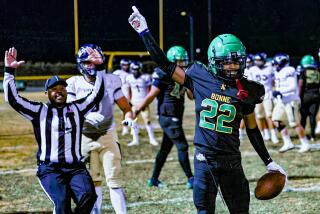TCU Is Placed on 3-Year Probation, Angering Wacker
- Share via
FORT WORTH — The National Collegiate Athletic Assn., citing numerous violations in the football program at Texas Christian University, including providing players with prostitutes, imposed a three-year probation on the TCU program Friday and sharply limited the number of football scholarships that can be awarded by the school.
The NCAA said the penalties were less severe than they might have been, owing to the school’s cooperation with investigators. But TCU Coach Jim Wacker angrily said the penalties were still too harsh.
“I think we just set back self-disclosure,” Wacker said. “I think we missed the opportunity to advance self-disclosure.”
The NCAA, describing the case at TCU as one of the most serious it has investigated, cited 64 violations of NCAA bylaws in its decision to put the Horned Frogs on probation for three years and to limit them to 10 football scholarships next year and to 15 in 1988.
Division I-A schools normally are allowed 30 scholarships a year and an overall limit of 95 scholarship players at one time.
TCU was also banned from bowl games next season and will be forced to forfeit $343,203 in television revenue from the 1983 and 1984 football seasons. However, the Horned Frogs can appear on television during the regular season over the three-year probation period.
Also, six unnamed boosters were ordered to disassociate themselves from the TCU athletic program. The boosters were not identified but were believed to include Dick Lowe, who admitted making payments to players.
David Berst, director of enforcement for the NCAA, said that the organization would have assessed stiffer penalties had TCU not cooperated with investigators and dismissed seven athletes, including running back Kenneth Davis, from the team last September.
Seventeen violations in the football program were cited by the NCAA, including providing players with prostitutes.
“Approximately four days prior to the letter-of-intent signing date in February 1981, a representative of the university’s athletic interest transported a prospective player to a local motel where lodging was provided until the signing date and the young man was entertained with meals and prostitutes,” the NCAA statement said, citing one example of such an occurrence.
Most of the violations reportedly occurred during the tenure of coach F.A. Dry, who was fired after the 1981 season.
More to Read
Go beyond the scoreboard
Get the latest on L.A.'s teams in the daily Sports Report newsletter.
You may occasionally receive promotional content from the Los Angeles Times.










